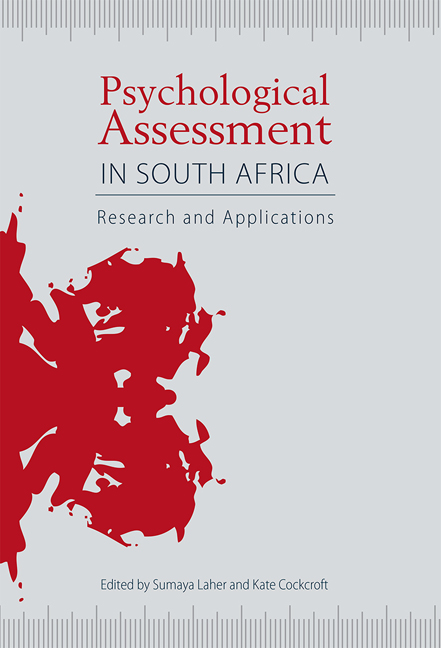Book contents
- Frontmatter
- Contents
- Tables and figures
- Acknowledgements
- Acronyms and abbreviations
- 1 Contextualising psychological assessment in South Africa
- Section One Cognitive tests: conceptual and practical applications
- Section Two Personality and projective tests: conceptual and practical applications
- 14 The Sixteen Personality Factor Questionnaire in South Africa
- 15 Using the Fifteen Factor Questionnaire Plus in South Africa
- 16 The Basic Traits Inventory
- 17 The Myers-Briggs Type Indicator® in South Africa
- 18 The NEO-PI-R in South Africa
- 19 Using the Occupational Personality Profile in South Africa
- 20 The Occupational Personality Questionnaire
- 21 The Millon Inventories in South Africa
- 22 Assessment and monitoring of symptoms in the treatment of psychological problems
- 23 Assessment in routine clinical and counselling settings
- 24 Projective assessment of adults and children in South Africa
- 25 The use of the Children's Apperception Test and Thematic Apperception Test in South Africa
- 26 Projective assessment using the Draw-A-Person Test and Kinetic Family Drawing in South Africa
- 27 The Rorschach in South Africa
- Section Three Assessment approaches and methodologies
- Contributors
- Index
24 - Projective assessment of adults and children in South Africa
from Section Two - Personality and projective tests: conceptual and practical applications
Published online by Cambridge University Press: 21 April 2018
- Frontmatter
- Contents
- Tables and figures
- Acknowledgements
- Acronyms and abbreviations
- 1 Contextualising psychological assessment in South Africa
- Section One Cognitive tests: conceptual and practical applications
- Section Two Personality and projective tests: conceptual and practical applications
- 14 The Sixteen Personality Factor Questionnaire in South Africa
- 15 Using the Fifteen Factor Questionnaire Plus in South Africa
- 16 The Basic Traits Inventory
- 17 The Myers-Briggs Type Indicator® in South Africa
- 18 The NEO-PI-R in South Africa
- 19 Using the Occupational Personality Profile in South Africa
- 20 The Occupational Personality Questionnaire
- 21 The Millon Inventories in South Africa
- 22 Assessment and monitoring of symptoms in the treatment of psychological problems
- 23 Assessment in routine clinical and counselling settings
- 24 Projective assessment of adults and children in South Africa
- 25 The use of the Children's Apperception Test and Thematic Apperception Test in South Africa
- 26 Projective assessment using the Draw-A-Person Test and Kinetic Family Drawing in South Africa
- 27 The Rorschach in South Africa
- Section Three Assessment approaches and methodologies
- Contributors
- Index
Summary
This chapter provides an introduction to the theoretical concepts that underlie projective assessment and includes a brief history of projective testing. The current debates in the literature that surround projective assessment are outlined, and the limitations of projective tests are discussed in relation to research conducted into the reliability and validity of various projective tests. The criticisms levelled against these tests are balanced against arguments for their clinical utility. The prevalence of this form of testing in clinical practice, internationally and in South Africa, is briefly discussed, as is the use of this form of testing in adult and child populations. The use of these tests in forensic settings is also briefly addressed; however, research into the cross-cultural validity of this form of testing is a central focus of the chapter. Common problems relating to the cross-cultural use of these Westernised assessment measures are also outlined. A discussion of the fact that clinical practice often precedes research regarding adaptations in the use of tests is included, and clinical illustrations of adapted interpretations accounting for socio-economic and cultural variations are described. The necessity for socio-cultural awareness in mental health practitioners in relation to this form of testing is highlighted.
The scope of projective assessment
Projective assessment refers to the measurement of personality traits or characteristics, using instruments in which the stimulus is a task or activity that is vague or ambiguous. These tests allow for a less restricted response from the person being assessed than the limited choice of responses usually associated with objective personality measures, such as ‘yes’, ‘no’, ‘sometimes’ or a Likert scale. Typically, when using projective assessments, a task such as responding to an image, telling a story about a picture, completing an unfinished sentence or drawing a picture is presented to a person who is then required to generate a response, with minimal external guidance or constraints imposed on the nature of that response. The assumption that underlies these tests is that when a person is called upon to generate a response in the face of ambiguity, the person projects elements of her personal characteristics into her response (Meyer & Kurtz, 2006).
- Type
- Chapter
- Information
- Psychological Assessment in South AfricaResearch and Applications, pp. 336 - 354Publisher: Wits University PressPrint publication year: 2013



